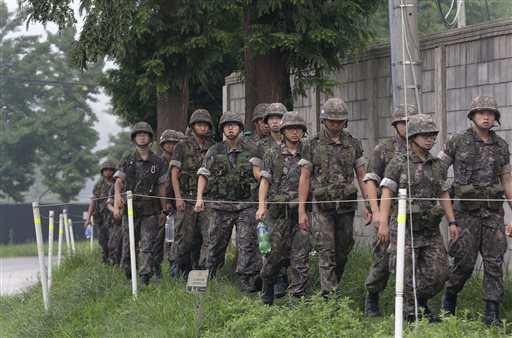North Korea warns of war after exchange of fire with South

South Korean army soldiers walk on the way to returning to their base after a patrol, in Paju, south of the demilitarized zone that divides the two Koreas, South Korea, Friday, Aug. 21, 2015. South Korea fired dozens of shells Thursday at rival North Korea after the North lobbed several rounds across the world’s most heavily armed border and threatened to take further action unless Seoul ends its loudspeaker broadcasts. The North denied it fired any shots and warned of retaliation for what it called a serious provocation. AP PHOTO
PYONGYANG, North Korea — North Korea on Friday declared its frontline troops in a “a quasi-state of war” and warned of military operations a day after the rival Koreas exchanged fire across the world’s most heavily armed border.
The North has made similar bombastic claims before and the huge numbers of soldiers and military equipment stationed along the Koreas’ tense border mean the area is always essentially in a “quasi-state of war.” Still, the declaration, following South Korea’s firing of dozens of shells across the border after the North lobbed several rounds at a South Korean town, signals a worrying development.
The North’s official Korean Central News Agency reported Friday that leader Kim Jong Un ordered at an emergency military meeting that his troops “be fully ready for any military operations at any time from 5 p.m. (0730 GMT) Friday.”
READ: Kim Jong-Un orders frontline N. Korea troops onto war footing
The report said that “military commanders were urgently dispatched for operations to attack South Korean psychological warfare facilities if the South doesn’t stop operating them.”
Seoul said the North fired Thursday across the Demilitarized Zone to back up an earlier threat to attack South Korean border loudspeakers that, after a lull of 11 years, have started broadcasting anti-Pyongyang propaganda. North Korea, which denies firing at the South, later said the South Korean shells landed near four military posts but caused no injuries. No one was reported injured in the South, either, though hundreds were evacuated from frontline towns.
READ: Rival Koreas trade artillery fire at border
The loudspeaker broadcasts began after South Korea accused the North of planting land mines that maimed two South Korean soldiers earlier this month.
Authoritarian North Korea, which has also restarted its own propaganda broadcasts, is extremely sensitive to any criticism of the government run by leader Kim Jong Un, whose family has ruled since the North was founded in 1948. Pyongyang worries that the critical broadcasts could weaken Kim’s grip on absolute power, analysts say.
North Korea first fired a single round believed to be from an anti- aircraft gun, which landed in a South Korean border town on Thursday afternoon, Seoul said. About 20 minutes later, several more artillery shells fell on the southern side of the Demilitarized Zone dividing the two Koreas.
South Korea responded with dozens of 155-milimeter artillery rounds, according to South Korean defense officials.
The exchange stopped there, but the North’s army later warned in a message that it would take further military action if South Korea didn’t pull down the loudspeakers.
South Korea raised its military readiness to its highest level. Joint Chiefs of Staff spokesman Jeon Ha-kyu told a televised news conference that South Korea is ready to repel any additional provocation. Defense officials said South Korea will continue the loudspeaker broadcasts despite the threats.
The artillery exchange comes during another point of tensions between the Koreas: annual U.S.-South Korean military drills that North Korea calls an invasion rehearsal. Seoul and Washington say the drills are defensive in nature.
South Korean President Park Geun-hye convened an emergency National Security Council meeting and ordered South Korea’s military to “resolutely” deal with any provocation by North Korea.
In Washington, State Department spokesman John Kirby said the U.S. was worried by the North’s firing into South Korea and closely monitoring the situation.
About 80 residents in the South Korean town where the shell fell, Yeoncheon, were evacuated to underground bunkers, and authorities urged other residents to evacuate, a Yeoncheon official said, requesting anonymity because he wasn’t authorized to speak to the media. South Korea’s Yonhap news agency reported that a total of about 2,000 residents along the border were evacuated.
While the Koreas regularly exchange hostile rhetoric, it is also not unusual for fighting to occasionally erupt. Last October, North Korean troops opened fire at areas in Yeoncheon, after South Korean activists launched balloons there that carried propaganda leaflets across the border. South Korea returned fire, but no casualties were reported. Later in October, border guards from the two Koreas again exchanged gunfire along the border, without any casualties.
Before that, the Koreas tangled in a deadly artillery exchange in 2010, when North Korean artillery strikes on a South Korean border island killed four South Koreans. Earlier in 2010, an alleged North Korean torpedo attack killed 46 South Korean sailors.
North Korea’s army said recently in a statement that the South Korean propaganda broadcasts were a declaration of war and that if they were not immediately stopped “an all-out military action of justice” would ensue. Pyongyang says that Seoul fabricated its evidence on the land mines and demanded video proof.
South Korea has said the two soldiers wounded from the mine explosions were on a routine patrol in the southern part of the DMZ that separates the two Koreas. One soldier lost both legs and the other one leg.
The Koreas’ mine-strewn DMZ is a legacy of the 1950-53 Korean War, which ended with an armistice, not a peace treaty, leaving the Korean Peninsula still technically in a state of war.














